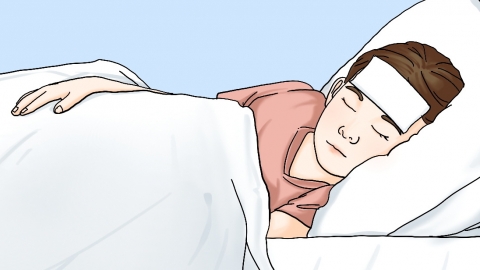What should be done for children with fever and headache?
Generally speaking, fever refers to an elevated body temperature. Fever and headache in children may be caused by reactions of the thermoregulatory center, lack of sleep, upper respiratory tract infections, otitis media, meningitis, and other factors. Treatment options, such as general care and medication, can be used under a doctor's guidance. Detailed explanations are as follows:

1. Thermoregulatory Center Reaction
In children, the thermoregulatory center is not yet fully developed and is more sensitive to changes in environmental temperature and heat generated by internal metabolism. When excessive heat accumulates in the body, the thermoregulatory center may respond by increasing body temperature, which may be accompanied by headache to alert the body to initiate heat dissipation. It is important to maintain a suitable indoor temperature and avoid excessive warming or exposure to cold. Additionally, a proper schedule of activity and rest should be maintained to prevent overexertion.
2. Lack of Sleep
Adequate sleep is crucial for children's growth and development. Sleep deprivation may prevent the brain from getting enough rest, affecting nerve function and potentially leading to headache and elevated body temperature. Establishing a regular sleep schedule and ensuring sufficient sleep time are important. A quiet and comfortable sleeping environment should also be provided to improve sleep quality.
3. Upper Respiratory Tract Infection
Upper respiratory tract infections are commonly caused by viral or bacterial infections and often occur during seasonal changes or in crowded places. When pathogens invade the body and trigger an inflammatory response, symptoms such as elevated body temperature and headache may occur. Nasal congestion and runny nose may also be present. Medications such as ribavirin granules, amoxicillin-clavulanate potassium granules, and paracetamol oral solution may be used under a doctor's guidance.
4. Otitis Media
Otitis media is usually caused by bacterial or viral infection. Inflammation can increase pressure, stimulate the ear nerves, and cause headache. The inflammatory response may also lead to elevated body temperature. Symptoms such as ear pain and pus discharge may also occur. Treatment may include medications such as cefixime granules, ibuprofen suspension drops, and ofloxacin ear drops, as prescribed by a doctor.
5. Meningitis
Meningitis is typically caused by infection of the meninges and spinal cord membranes by pathogens such as bacteria, viruses, or fungi. Pathogens multiplying on the meninges can trigger inflammation, resulting in severe headache and elevated body temperature. Symptoms such as neck stiffness and vomiting may also appear. Medications such as penicillin G sodium for injection, acyclovir injection, and dexamethasone acetate injection may be used under a doctor's recommendation.
In daily life, a balanced diet should be maintained to ensure adequate and varied nutrition for children. Encourage children to engage in moderate physical activity to enhance their physical fitness and immunity. Additionally, regular health check-ups should be conducted to detect and address potential health issues promptly.




